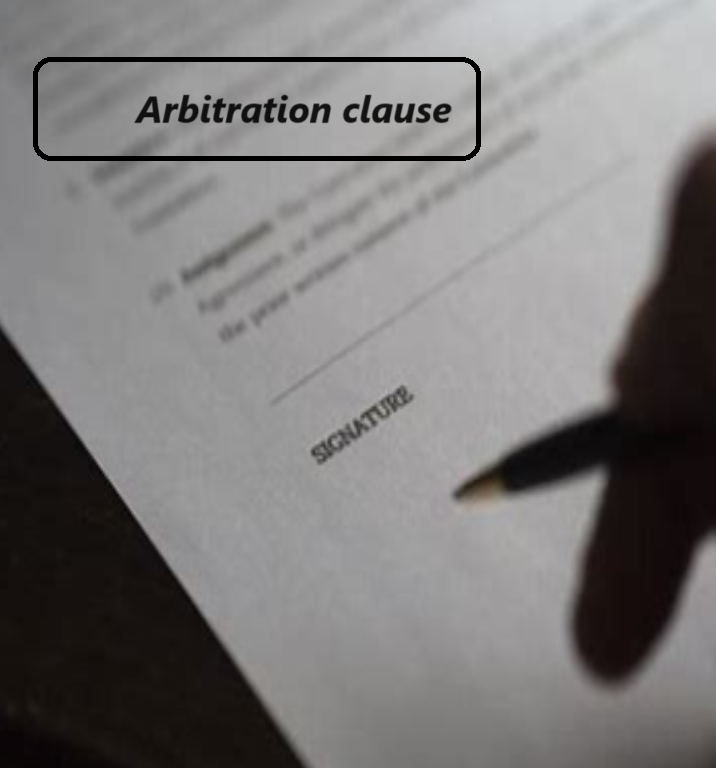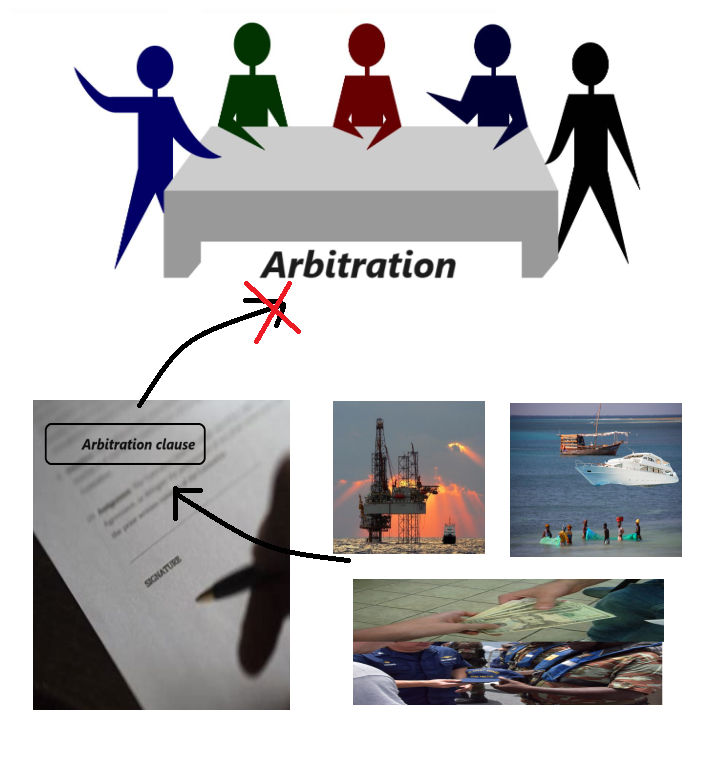Republic of Mozambique v Privinvest Shipbuilding SAL (Holding) & Ors [2023] UKSC 32 (20 September 2023)
Citation: Republic of Mozambique v Privinvest Shipbuilding SAL (Holding) & Ors [2023] UKSC 32 (20 September 2023)
Rule of thumb: Stare-decisis: Do arbitrators have jurisdiction/stay to determine liability & quantum on corruption & bribery allegations? No, as a general rule arbitrators do not have jurisdiction/stay to determine either liability or quantum. These allegations have to be disputed in the Court.
Background facts: The basic facts of this case were that the Republic of Mazimbique owned all the shares in 3 companies – Special purpose vehicles – SPV’s. These were to be shipping companies that would assist in both tuna fishing & for the transportation of oil & gas from the sea back to land.
These Mozambique companies entered into supply of services agreements with Privinvest & Others who would use their ships for services related to fishing & oil transportation.
It was alleged by the Mozambique Attorney General that Privinvest & Others were carrying out practices and paying corrupt public officials – this encompasses a wide range of illegal activity, for example, bribery to get the contracts in the 1st place, & avoiding paying transactional taxes & downplaying the size of the loads collected from the sea etc.
Mozambique’s Attorney General sued Privinvest & Others in Court for these practices, but wanted quantum to be determined in arbitration if they were successful in Court.




Parties argued: This case invoked the principle of stay/jurisdiction – namely, whether an arbitrator had ‘jurisdiction’ to have a ‘stay’ to actually decide upon the liability & quantum for corruption allegations by the Mozambique Government against the companies.
Privinvest & Others argued that corruption was not a matter which could be litigated under arbitration. They argued that this was a matter which had to be dealt with in other Court proceedings.
The Mozambique Attorney General basically argued that the amount that they were owed for these things could be ascertained at arbitration, with Court proceedings on the liability running at the same time.
Court held: The Court held that arbitrators do not have arbitration & a stay to consider the legalities – either liability or quantum - of corruption allegations of this nature against companies, whether for liability or quantum. The Court held that under the Arbitration Act this was not the type of matter which arbitration was suited to - this matter & the truth of the allegations had to be handled & decided via other channels. Arbitration is instead purely for the nuts & bolts of how the actual commercial operation is to be run, with actual objective considerations about the technicalities of how services are to be provided, and not for determining criminal matters & criminal allegations such as these.

Ratio-decidendi:
3. ‘ The disputes between the Republic of Mozambique (“the Republic”) and the respondents have arisen from three transactions in 2013 and 2014, in which three special purpose vehicles (“the SPVs”), each of which is indirectly wholly owned by the Republic, borrowed money from London-based banks apparently to finance the purchase of equipment and services under three supply contracts with the sixth to eighth defendants (“the Privinvest supply companies”) in connection with the Republic’s development of its Exclusive Economic Zone (“EEZ”), in particular through tuna fishing and the exploitation of its gas resources. As explained in 1(c) below, each of the Privinvest supply companies in back-to-back agreements sub-contracted its role to another Privinvest entity, the ninth and tenth defendants. I refer to the various Privinvest companies together as “Privinvest”. The London-based banks from whom the SPVs borrowed the funds to purchase the goods and services were Credit Suisse International (“CSI”), Credit Suisse AG (“CSAG”) and Credit Suisse Securities (Europe) Ltd (“CSSE”) (together “Credit Suisse”) and another bank, VTB Capital plc (“VTB”). Each of the supply contracts contained an arbitration agreement which I discuss in part 1(c) below. The borrowing was secured by sovereign guarantees which were signed by Mr Manuel Chang, who was then the Republic’s Minister of Finance, purportedly acting on behalf of the Republic….
53. In the context of international arbitration, section 9 of the 1996 Act gives effect to article II(3) of the UN Convention on the Recognition and Enforcement of Foreign Arbitral Awards (1958) (“the New York Convention”) which provides: “The court of a Contracting State, when seized of an action in a matter in respect of which the parties have made an agreement within the meaning of this article, shall, at the request of one of the parties, refer the parties to arbitration, unless it finds that the said agreement is null and void, inoperative or incapable of being performed.” …
105. The court in ascertaining the scope of an arbitration agreement must have regard to what rational businesspeople would contemplate. The Swiss law principle of in favorem arbitri in the construction of an arbitration agreement reflects the idea that parties to an arbitration agreement are deemed to have intended that arbitration should be the single forum for resolution of their disputes rather than the court. See Waksman J’s judgment at para 77. This is analogous to the approach in English law set out by this court in Enka Insaat at para 107 which I have quoted in para 46 above: rational businesspeople are likely to intend that any dispute arising out of their contractual relationship be decided by the same tribunal. That consideration is consistent with the comment of Sundaresh Menon CJ in Tomolugen at para 113 that in most cases the matter covered by the arbitration agreement would encompass the claims made in the legal proceedings (para 61 above).
106. In this case the arbitration agreements do not. For the reasons discussed above, there is no question of the arbitration agreements extending to cover the Republic’s allegations on which it relies to establish the legal liability of Privinvest. It is in the context of those legal claims that Privinvest seeks credit, by way of reduction of the damages claimed by the Republic, for the value of the goods and services which the Republic received under the supply contracts.
107. It does not matter that the parties to those contracts may not have foreseen at the time when each supply contract was entered into that there might be a multi-party litigation encompassing the three supply contracts and involving not only the Privinvest supply companies but also their subcontractors, Credit Suisse and the CS team defendants. The question for the court is whether the partial defence on quantum arising in the context of these legal proceedings, in which the legal claims are not within the scope of the arbitration agreements, is a matter which the parties are to be treated as having agreed to refer to arbitration. In my view, it is not. Section 9 of the 1996 Act is to be applied with common sense. Rational businesspeople would not seek to send to arbitration such a subordinate factual issue arising in such legal proceedings and the arbitration agreements must be construed accordingly.
108. While each case must be assessed in the light of its particular circumstances, I am supported in this conclusion by the fact that there are no recorded cases under section 9 of the 1996 Act of the court granting a partial stay of legal proceedings for the determination by an arbitral tribunal of a dispute about the quantification of damages claimed in those legal proceedings in which the contested legal claims were beyond the scope of an arbitration agreement. In other words, there is no evidence of court decisions effecting the bifurcation of a dispute as to quantification of damages from contested claims as to liability.
109. I therefore conclude that there should not be a partial stay of the legal proceedings in relation to this factual dispute concerning the quantification of the Republic’s claims. The trial scheduled for this autumn can proceed to address that issue in the Republic’s claims against Privinvest’.
Lord Hodge
Warning: This is not professional legal advice. This is not professional legal education advice. Please obtain professional guidance before embarking on any legal course of action. This is just an interpretation of a Judgment by persons of legal insight & varying levels of legal specialism, experience & expertise. Please read the Judgment yourself and form your own interpretation of it with professional assistance.

